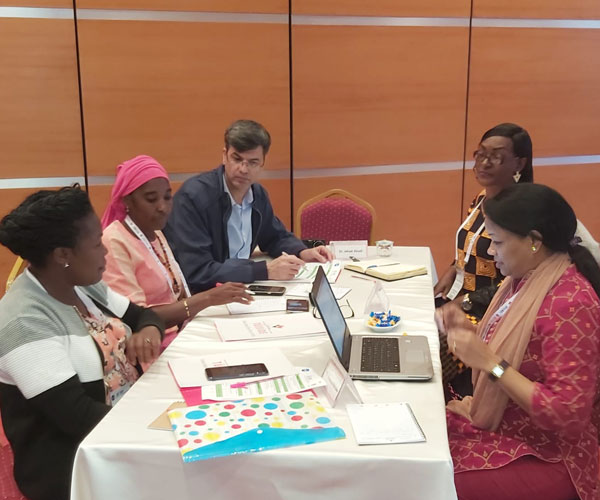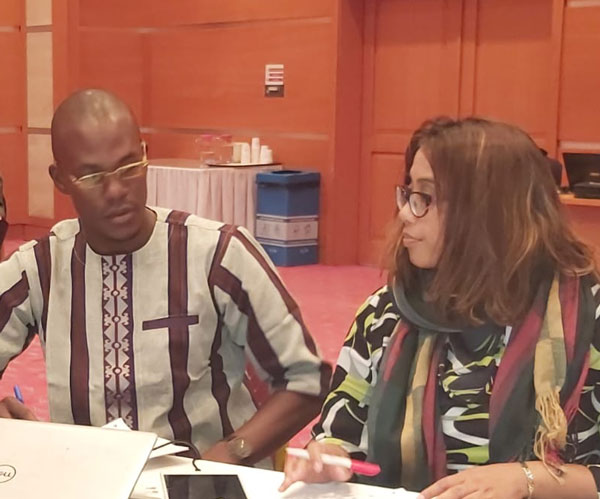
Challenges like energy supplies, biodiversity protection and climate change have an impact on all of us without exception. On one hand Swedish environmental activist Greta Thunberg is urging governments to hurry and take concrete action on global warming, and the whole world seems to respond. But on the other hand, achievement of the Sustainable Development Goals (SDGs), still appears far out of reach.
Is it because of a communication gap among decision makers, politicians, the research community and environmentalists? Is it due to misinformation and surging distrust towards science? Whatever the reason, young scientists are likely to be a powerful resource for implementing the SDGs, provided they receive adequate training, experts at a workshop in Turkey suggested.
"Challenges like climate change, health, education and workforce redundancy in the wake of 4th Industrial Revolution need a collective response at all levels. This is not possible without meaningful and effective partnerships and due involvement of international organizations," said Junaid Zaidi, the executive director of the high-level Commission on Science and Technology for countries of the South (COMSATS).
Junaid Zaidi is the founder rector of the COMSATS Institute of Information Technology (CIIT), Pakistan’s first exclusive institute of information technology, which has recently become a world-class institution of higher learning under Zaidi leadership.
Zaidi added: "International partnerships, particularly through South-South and triangular cooperation are of pivotal importance in achieving the SDGs. The holding of this workshop is therefore very timely, because all of the selected participants are young scientists and researchers hailing from the developing countries, owing to the fact that their integration in global efforts for achieving SDGs is crucial."
He offered his welcome address at the workshop organized in Gebze, Turkey (3-5 December 2019), by COMSATS and TWAS. The workshop - titled "Sustainability, SDGs and Global Challenges" - was generously sponsored by the Swedish International Development Cooperation Agency (Sida) and hosted by TUBITAK, the Turkish Scientific and Technological Research Foundation that offered the venue.
The international event that had, in the audience, 25 young scientists from S&T lagging countries, has been organized with a precise goal: raising awareness about the UN Sustainable Development Goals, and building scientific capacity and visionary perspective among young scientists and researchers in the Least Developed Countries (LDCs).
Orkun Hasekioğlu, the executive vice president at TUBITAK, who is responsible for research institutions and international relations was a guest participant; Feng Kai, the representative of the TWAS - East and South-East Asia and the Pacific Regional Partner (TWAS-SAPREP), has provided support to the event.
Footprints of the human activity are everywhere, with a heavy impact on climate: from land degradation to Oceans acidification, to rainfalls with higher intensity and extreme weather events.
"We have shifted from the Holocene and entered a new epoch, the Anthropocene, where humans have become a geological-magnitude force for planet Earth," observed Opha Pauline Dube, an associate professor in the Department of Environmental Science at the University of Botswana (UB), and and a global leader in environmental change.
Dube, an invited speaker at the workshop, is also the founder and chair of the Botswana Global Environmental Change Committee (BGCC) at UB and has been a co- author in several Intergovernmental Panel on Climate Change (IPCC) assessment reports including the special report on the impacts of global warming of 1.5 °C above pre-industrial levels and related global greenhouse gas emission pathways, in the context of strengthening the global response to the threat of climate change, sustainable development, and efforts to eradicate poverty.
Humans, she added, are triggering a dramatically fast rate of change in population growth, urbanization, and resource exploitation. Dams, for example, were built to benefit agriculture and economies – and this was true for a while. But in the long run, they affect moisture availability, contribute to increasing salinity of rivers and offer breeding grounds to malaria vectors.
Desertification and unprecedented higher energy consumption are also a consequence of the Anthropocene, with industrialized countries that host 25% of the world population consuming 75% of the world's energy supply.
But international and national climate change policymakers have treated climate adaptation and mitigation as separate efforts, so far. "Under this perspective, can we still successfully address SDGs as separate goals?" Dube asked. All nations, she suggested, should define more reasonable standards of living based on circular economies, new social norms for sustainable lifestyles and a holistic approach in planning infrastructure. "We have the ability to make significant transformations for the better, now. We should not waste our chance."
Humans are not the only species on the planet, according to a Census of Marine Life estimating that the total number of species on Earth could be close to 8.7 million (+/- 1.3 million). But certainly the human species is the most problematic, pointed out Boudjéma Samraoui, professor of biology at Badji Mokhtar University in Annaba, Algeria.
"Of all the species that ever existed on Earth, 99% are now extinct, and that correlates closely with our presence and activity on this planet," Samraoui said showing a chart where the growing presence of humans on Earth parallels the fast extinction of many species.
Demographic problems, habitat fragmentation and loss, and alien species invading new habitats not in accordance with their needs may trigger epidemics and emerging diseases, or lead to sudden disappearances of species that are critical in the global food chain.
"No one is safe in front of this threat, and if we don't become aware of how quickly we are causing this biological annihilation – 100 times faster than in the past – we might get out of bed, one day, and find that we are the stars of the 6th mass extinction," he warned.
"Scientifically and Technologically lagging countries are more exposed than others to fast-paced changes," added Max Paoli, TWAS's programme coordinator. Diseases and epidemics, poor food quality, lack of sanitation and education affect populations that tend to crowd in metropolitan areas, facing exponential growth trends, and problems. This in turn worsens the governments' coping capacity.
"S&T lagging countries should develop novel criteria that sustain, for example, urban growth and allow better management of urban supplies and waste," Paoli added. "All is connected and our current unsustainable development may only exacerbate the situation. It's time that researchers - and particularly young researchers - raise their voice within their communities, universities and local institutions, to promote better sustainable plans."
Scientific presentations and breakout sessions gave the participants an opportunity to engage each other and come up with new ideas and strategies. This is how the workshop laid the ground for more active involvement of scientists in their home countries. As Rebecca Nekaka, an assistant lecturer at Busitema University Faculty of Health Sciences in Uganda said: "Today we heard about the role of education for sustainable development, and I am very motivated to take what I have learned in my own career."
The importance of raising awareness among future generations, and of better resource management inspired other scientists in the audience. For Atunga Nyachieo, a senior research scientist and chief of research at the Institute of Primate Research in Kenya, the event taught him about the essential role of biodiversity conservation. "Climate change," he said "leads to loss of biodiversity, and without biodiversity there is no life."
And Florence Anato, from the laboratory of agricultural entomology of the Faculty of Agronomics Sciences-University of Abomey-Calavi, in Benin echoed: "Facing the biodiversity decline we have to change our mind and increase people's education to preserve the future of our children."
The workshop also provided the opportunity to celebrate Islamabad-based COMSATS' Centre for Climate and Sustainability (CCCS), a virtual and physical network of centres collecting 14 COMSATS member countries and centres of excellence. "SDGs have been at the core of COMSATS’ activities," recalled Zaidi. " We strongly believe that our collaboration with TWAS over the years has been immensely beneficial and look forward to enhanced collaboration in future in the areas of mutual interest."
Cristina Serra

